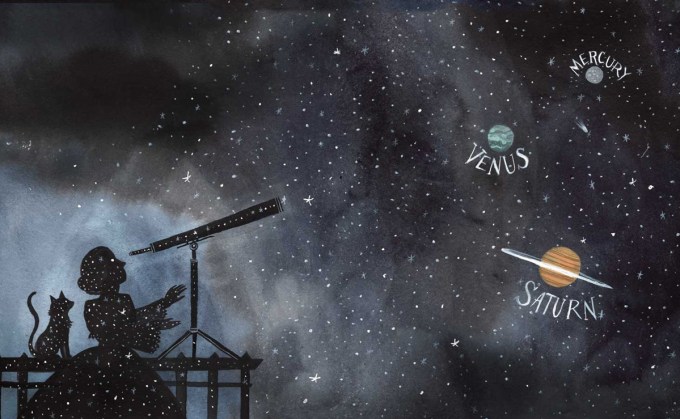What Miss Mitchell Saw: An Illustrated Celebration of How 19th-Century Astronomer Maria Mitchell Blazed the Way for Women in Science
By Maria Popova
“Mingle the starlight with your lives and you won’t be fretted by trifles,” Maria Mitchell (August 1, 1818–June 28, 1889) often told her Vassar students — the world’s first university class of professionally trained women astronomers — having herself become America’s first professional woman astronomer, thanks to her historic discovery of a new telescopic comet on October 1, 1847, after sixteen tenacious years of sweeping the sky night after night.
Mitchell (whose extraordinary life was the seed for what became Figuring and to whom the inaugural Universe in Verse was dedicated) not only went on to blaze the way for women in STEM but used her prominence — she was arguably America’s first true scientific celebrity, welcomed in England, Italy, and Russia as a dignitary of the New World — to become one of the nineteenth century’s most ardent advocates for social reform, advancing women’s rights and abolition.
The epoch-making discovery that became the platform for Mitchell’s modeling of possibility and far-reaching influence is the kernel of the lovely picture-book What Miss Mitchell Saw (public library) by author Hayley Barrett and illustrator Diana Sudyka — a splendid addition to the most inspiring picture-book biographies of cultural heroes.
Barrett’s lyrical prose opens with a clever and tender solution to the common pronunciation confusion — Mitchell’s first name is spelled like my own but pronounced the presently atypical traditional Latin way:
On the first day of August, in a house tucked away on the fog-wrapped island of Nantucket, a baby girl was born.
Like all babies, this baby was given a name.
Her parents whispered it to her like a gentle breeze, ma…RYE…ah…
Names become a central creative trope in the book — the dignifying, truth-affirming act of calling all realities by their true names. We see the young Maria learn to recognize the ships of this whaling community by name and come to know the local shopkeepers by name.
Finally, after her father apprentices her as his astronomical assistant, she learns the stars by name — a testament to bryologist Robin Wall Kimmerer’s astute observation that “finding the words is another step in learning to see.”
Sudyka’s beautiful gouache-and-watercolor illustrations weave together hand-lettered words from the story with the three great animating forces of Mitchell’s early life: the enchantment of the cosmos, the whaling culture of Nantucket, and her family’s Quaker values. (In Figuring, writing about the factors that fomented Mitchell’s unexampled ascent above the common plane of possibility for women in her era, I point to the original use of the word genius in the term genius loci — Latin for “the spirit of a place” — and wonder whether, despite her incontrovertible natural gift for mathematics, she would have so soared had she not grown up in a secluded whaling community, where matriarchs ruled while men spent months and years on whaling trips, where Quakers lived by the then-countercultural ethos of equal education for boys and girls, where a barren landscape and long winter nights turned astronomy into cherished popular entertainment.)
The book ends with the motto emblazoned on the gold medal Mitchell received from the King of Denmark for her landmark discovery — “Not in vain do we watch the setting and the rising of the stars” — a sentiment that echoes the dying words of the great astronomer Tycho Brahe, which Adrienne Rich incorporated into her exquisite tribute to Caroline Herschel, the world’s first professional woman astronomer: “Let me not seem to have lived in vain.”
Complement the wondrous What Miss Mitchell Saw with the picture-book biographies of other inspiring cultural figures — Ada Lovelace, Louise Bourgeois, Jane Goodall, Jane Jacobs, John Lewis, Frida Kahlo, E.E. Cummings, Louis Braille, Pablo Neruda, Albert Einstein, Muddy Waters, Nellie Bly, Wangari Maathai — then revisit Mitchell’s abiding wisdom on friendship, social change, science, spirituality, and our search for truth, and the art of knowing what to do with your life.
—
Published October 1, 2019
—
https://www.themarginalian.org/2019/10/01/what-miss-mitchell-saw/
—



















ABOUT
CONTACT
SUPPORT
SUBSCRIBE
Newsletter
RSS
CONNECT
Facebook
Twitter
Instagram
Tumblr